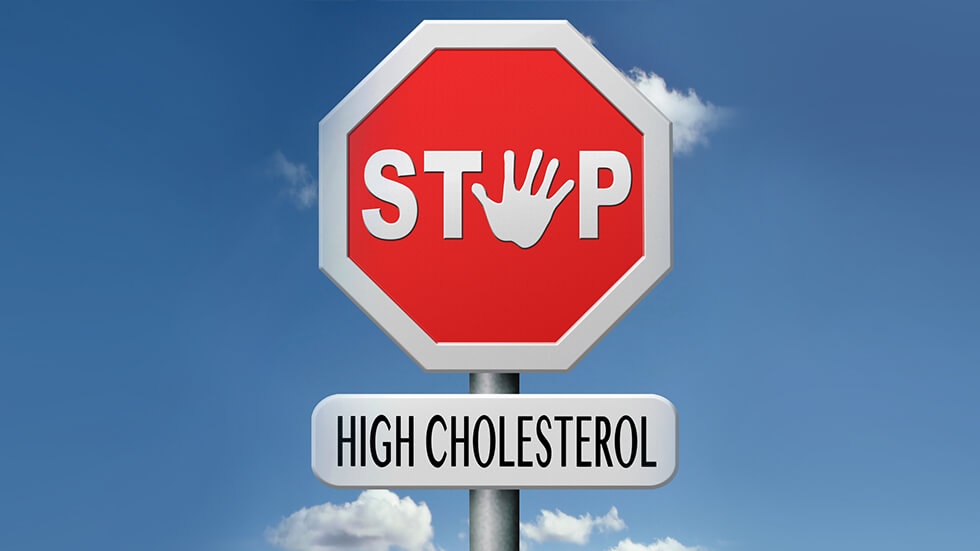Cholesterol is vital for the formation of healthy cells membranes, certain hormones, and vitamin D. It has a waxy fat like texture. However, when a high level of low-density lipoprotein (bad cholesterol) gets accumulated in the blood vessels, it causes high cholesterol, which if left untreated can lead to the chances of developing heart disease.
So if you’ve been diagnosed with high cholesterol, you need to retool your daily routine and eating habit to make them healthier. But before we delve down to discuss a cholesterol-friendly lifestyle, let us know more about cholesterol, its types, what are the causes of high cholesterol, and how high cholesterol can lead to heart disease and heart attack chances.
Why is high cholesterol a risk for heart attack?
When there is too high level of bad cholesterol (low-density lipoprotein) or too low level of HDL (high-density lipoprotein) in your blood, fatty deposit builds up in the arteries thus making it narrower to carry oxygenated blood to the heart. This can cause a condition called atherosclerosis – a form of heart disease.
If total cholesterol levels reach 240 mg/dl and above, and it is left untreated for long, it raises the chance of blockage in the heart which may result in sudden heart attack.
What are the types of cholesterol and their role in heart function?
Cholesterol is primarily classified into four types:
- Low-Density Lipoprotein (LDL) or Bad Cholesterol contributes to the formation of plaque build-up in the arteries and is linked to higher risk for heart attack and stroke. For a healthy heart function, the LDL level should always be less than 100mg/dL
- High-Density Lipoprotein (HDL) or the good cholesterol is also known as the Bad Cholesterol Eater as it tends to carry cholesterol away from the arteries and back to the liver. A healthy level of HDL (40mg/dL or higher) in the blood helps to protect against heart attack, while low levels of HDL (less than 40 mg/dL) can increase the risk of plaque build-up and heart disease.
- Triglycerides is another form of fat found in the blood. Many heart disease patients often have a high triglyceride levels. One should always have triglyceride numbers less than 150.
- Lipoprotein-A (Lp(a)) Cholesterol is a genetic variation of LDL (bad) cholesterol that may interact with substances found in artery walls and contribute to the buildup of fatty deposits. If your Lp (a) numbers are greater than the 30 mg/dL threshold, this may triple your risk of having a heart attack or stroke at an early age.
What are the factors that cause high cholesterol?
Many lifestyle factors such as smoking, consumption of diet rich in saturated and trans fat such as red meat, packaged foods like baked cookies, crackers, popcorn, soups with high sodium and sugar content, and lack of exercise, as well as presence of underlying condition, such as obesity, high blood pressure, diabetes are the factors that contribute to your risk of high bad cholesterol.
What are the warning signs of high cholesterol?
Some warning signs of high cholesterol are extreme fatigue, shortness of breath, pain in the neck, jaw, chest, upper abdomen, or back, and numbness or coldness at most of the time. Consult a doctor at the first sign to avoid any unwanted risk.
What is an ideal cholesterol level for a healthy heart?
For healthy functioning heart, the total cholesterol level should remain less than 200 mg/dl. While for people with heart disease, the LDL cholesterol should be always less than 70 mg/dl.
Why you should never stop your medication for high cholesterol and heart disease?
If you’re on a high cholesterol medication, you should never stop or skip on your prescribed drugs for cholesterol or hypertension , without consulting your doctor – , as it can increase your risk for heart attack or other cardiovascular events to two-fold.
If in any circumstances you forget or fail to take a dose, take it as soon as you remember. But, if it’s almost time for your next dose instead eating two doses to make up for the one you missed, start again with your regular dosing schedule with the next dose.
6 lifestyle changes to lower your high cholesterol and heart attack risk
When it comes to health, it largely depends on the lifestyle. Here’s what you should do to lower your cholesterol and heart disease risk:
- Exercise every day – Practicing at least 150 minutes of moderate exercise a week or 75 minutes of high-intensity aerobic activity a week, or a combination of both moderate and intense exercise can work wonders for your heart health.
- Eat mindful – To lower your cholesterol:
- Keep a count on your calorie intake
- Reduce consumption of saturated fats and carbohydrates to minimal.
- Limit your sugar and sodium intake
- Consume cholesterol-lowering foods, such as beans, fiber-rich fruits and vegetables, whole grains and nuts and seeds.
- Include foods rich in monounsaturated and polyunsaturated fats like olive oil, olives, almonds and walnuts, as well as foods rich in omega-3 fatty acids, such as salmon, tuna, and mackerel.
- Minimize stress – Stress itself can cause high blood pressure and high cholesterol as it leads to things like being inactive, overeating, and restlessness. Meditation, deep breathing exercises, dancing, painting, playing music or practicing any hobby of your choice helps to minimize stress.
- Say no to tobacco –
- Limit alcohol intake – Drink only on special occasions. Make sure to follow the Dietary Guidelines of American Heart Association which recommends women to have no more than one alcoholic drink a day, while men to have no more than two drinks a day.
- Sleep well– A good night sleep for 6 -7 hours is essential to keep a control on your cholesterol level.
Make smart choices now to set yourself up for a balanced cholesterol and healthy heart down the road.


